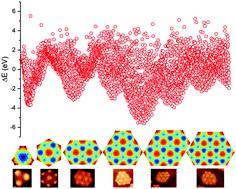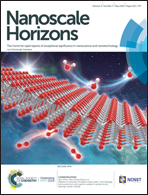How the moiré superstructure determines the formation of highly stable graphene quantum dots on Ru(0001) surface†
Abstract
Highly stable graphene quantum dots (HSGQDs) are widely observed in the initial stages of graphene chemical vapor deposition (CVD) growth on lattice-mismatched transition metal surfaces, e.g. Ru(0001), but their formation mechanism has so far remained a mystery. Using a combination of density functional theory calculations and theoretical modeling, we show that the sizes and the morphologies of HSGQDs are determined by the interaction of the graphene edge to the metal substrate interaction, which in turn, is modulated by the moiré superstructure, while the relatively weak interaction of the central atoms of graphene (or graphene bulk atoms (GB)) with the substrate plays a secondary role. The theoretical understanding of the effect of moiré superstructure on graphene CVD growth allows us to predict the formation of HSGQDs on various metal surfaces and provides a guideline to select the best catalyst for graphene growth.



 Please wait while we load your content...
Please wait while we load your content...